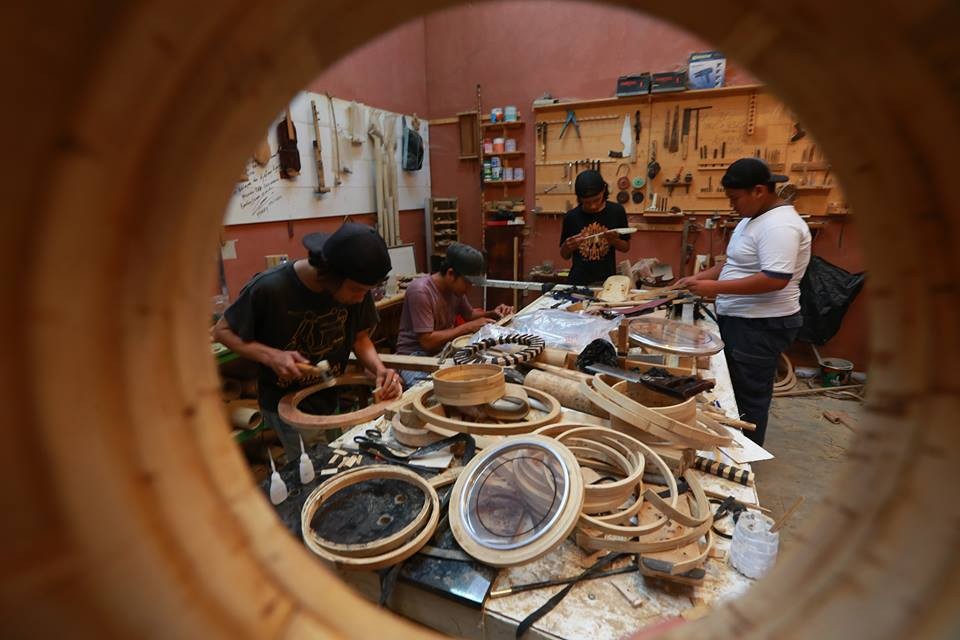Popular Reads
Top Results
Can't find what you're looking for?
View all search resultsPopular Reads
Top Results
Can't find what you're looking for?
View all search resultsYoung entrepreneurs drive social, ecological innovation
The resilience of micro, small and medium enterprises (MSMEs) is encouraging young people to venture into the business world despite a harsh economic environment.
Change text size
Gift Premium Articles
to Anyone
D
ominated by young people, micro, small and medium enterprise (MSME) businesspeople today tend to combine the pursuit of profits with social and environmental responsibilities.
Khilda Baiti Rohmah, 28, the founder of Sampahkoe in Cimahi, West Java, for instance, decided to become engaged in processing waste into something of high economic value after seeing the economic hardship experienced by garbage collectors in her neighborhood.
“I was thinking about how to help increase their income and promote their welfare without making them leave their job,” Khilda told The Jakarta Post at an exhibition on social and environmental innovation and entrepreneurship in Pasuruan regency, East Java, in October.
Khilda’s perseverance was fruitful. Under her leadership, 50 family members of scavengers now produce at least 25 types of products from trash, such as toothpaste tubes, cement sacks and plastic cases for soap.
“At first, my turnover was only Rp150,000 [US$11], but now it has reached Rp 248 million annually. I have 12 regular employees and promote the skills of almost 5,000 women,” said Khilda, who has expanded the sale of the products to Sweden, India, Japan, Korea, Australia, Brunei, Rwanda and China in cooperation with environmental NGOs.
Her social business has increased local people’s income by Rp 350,000 per family, empowered at least 40 women per sub-district, upgraded sewing and crafting skills and opened new job opportunities for at least 100 people in each town in the regency.
The technology graduate of Pasundan University, Bandung, currently works on processing paper waste into bioethanol and converting scrap polyvinyl chloride into merchandise of artistic value. Khilda’s targets for 2018 are to create 85 types of merchandise, set up galleries in five cities or regencies and five countries and rake in annual sales of Rp 400 million.
(Read also: Diffable craft from Bantul)
Adang Muhidin, another young entrepreneur, combines nature and music in his business venture. Together with some village youths, this native of Bandung, West Java, has developed a small business capitalizing on the region’s bamboo potential.
Adang has created 14 bamboo instruments and is now regarded the world’s first entrepreneur focusing on modern bamboo musical devices, which have been exported to 12 countries in Asia and Europe.
“It’s been my dream to explore bamboo through the innovation of bamboo musical instruments for the awakening of the creative industry in Indonesia,” said Adang, who is also the founder of the Indonesian Bamboo Community.
Adang, who holds a degree from a university of applied sciences in Iserlohn, Germany, can turn bamboo into guitars, violins, contrabasses, clarinets, cellos, saxophones and drums. The bamboo instruments vary in prices, with violins, for instance, priced at Rp 400,000 to Rp 2.5 million.
As Adang’s products are rare and of high economic value, most buyers live in far away countries in Africa, Europe, the US or Japan. They become aware of Adang’s creations through the internet.
He sells two to three instruments a month and has had only two buyers from Indonesia. “The biggest purchase came from France with an order of 700 saxophones. Now I wish to realize the creation of a bamboo piano,” Adang said. Meanwhile, Fitrotin Nisak, a young woman from Sukorejo district, Pasuruan regency, has utilized and processed fabric remnants from a garment producer near his home into articles of economic value. Through her rags processing business, Nisak has gains increasing income and provides jobs for women of the neighborhood.
“The profit from selling bags, wallets and laptop cases totals Rp15 million monthly,” she said.
(Read also: South Tangerang teaches children how to treat waste)
The trend of young people engaging in small but innovative social and environmental businesses is inseparable from tightening competition in Indonesia’s MSME segment, says Setyowati Rahayu, program manager at the Technology Innovation Foundation (Inotek).
“The young and idealist entrepreneurs are seeking ways of running businesses while fulfilling their social and environmental responsibility. Their number is still very small in Indonesia, but should increase,” said Setyowati.
Setyowati explained that small Indonesian businesses will face increasing challenges in the future. With the borderless ASEAN Economic Community effective as of early 2016, Indonesian small businesses must have competitive value, otherwise they will be lost in the aggressive market.
She said today capital owners have a penchant to find business people who are capable of creating an impact in society. They no longer merely aim for profits but will also seek to see a direct impact on social and environmental conditions.
“This has been demonstrated by MSME entrepreneurs in India, Singapore, the Philippines and Thailand. To be frank, Indonesia is still lagging behind. However, I’ve noticed some growth in this direction,” Setyowati said.
Finance Ministry data show that 99.9 percent of all business entities in Indonesia are MSMEs. The segment accounts for 97.2 percent of national employment and contributes 59.1 percent to the gross domestic product.
Every year, Inotek in cooperation with PT HM Sampoerna, screens proposals from hundreds of innovative MSMEs all over Indonesia for further selection. The top ten will be receive aid for their further business development.
Sampoerna president director Paul Janelle said the company under his management would continue to stimulate entrepreneurship in Indonesia.
“That’s in line with President Joko “Jokowi” Widodo’s Nine Points agenda, which includes national economic growth acceleration by boosting the competitiveness of MSMEs to contribute more to the Indonesian economy,” he said.











